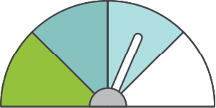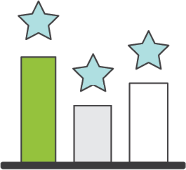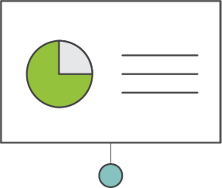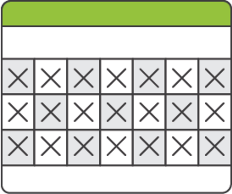Virtually all content marketers agree that data can boost your strategy and help you make decisions that drive better results. The best outcomes are driven by audience needs and interests — and your strategy should evolve with them.
That said, it’s easy to rely on gut and intuition when time doesn’t allow for digging into the data.
Good news for you: We did the digging into the latest benchmark reports and content marketing research so you can jump straight to the good stuff. From best practices to consumer insights, these content marketing statistics will give you the foundational knowledge to stay on trend.
Keep scrolling (or click below to jump straight to a category) for over 120 content marketing statistics that will help ground your strategy in data-driven insights.
Table of Contents
General Content Marketing Trends
78% of companies that believe their content marketing was very successful in 2021 have a documented content marketing strategy.
65%
of marketers say case studies and success stories are the biggest value drivers for their business.

Marketers rank email marketing, paid search/ads and organic search as the most effective channels.
58% of companies with more than 80 marketing employees say their efforts were “extremely successful” last year compared to 33% at companies with marketing departments of 30 or fewer employees.

82% of organizations plan to add, remove or replace components of their marketing tech stack to improve performance.
Only 13% of companies rely purely on internal creative ideas, while others employ a mix of company goals, competitor analysis, audience needs and digital data.

Marketing teams need to prioritize collecting first-party data at every stage of the customer journey.
Nearly half (46%) of marketers plan to use better data to create personalized content that serves the customer journey.

The biggest data privacy change to hit marketing in 2021 was Apple’s continued iOS updates.
83% of consumers in 2021 are aware that brands are using their personal data and 71% of users expressed concern over how companies are using their personal data.
Most marketers agree that blog articles (68%) and downloadable assets like eBooks and white papers (62%) are the best way to learn about content marketing.
B2B Content Marketing Trends

77% of B2B marketers report having a content marketing strategy, though only 40% documented their strategy.
B2B marketers say the top 3 goals content marketing helps them achieve are creating brand awareness, building credibility/trust and educating their audience.

The top 2 objectives for today’s B2B digital marketers are increasing customer engagement and improving customer experience.
66%
of B2B marketers expect their 2022 content marketing budget to increase over their 2021 budget.
is the organic social media platform that B2B content marketers use the most and the one they said produces the best results.
The top 2 content marketing-related areas of investment for 2022 are expected to be video (69%) and events (digital, in-person or hybrid) at 61%.
60%
of B2B marketers say that “wasted time” is the greatest cost associated with lead generation struggles.

68% of B2B marketing influencers regard research and case studies to be the most trusted type of content.
44%
of B2B buyers typically consume 3 to 5 pieces of content before engaging with a vendor.
Primary decision makers, internal influencers and researchers agree that pricing is the No. 1 variable that influences decision-making.
B2C Content Marketing Trends
70%
of B2C marketers report having a content marketing strategy, though only 39% documented their strategy.
65%
of B2C marketers prioritize the audience’s informational needs over their organization’s sales/promotional message.

Facebook is the organic social media platform that B2C content marketers used the most and the one they said produced the best results.
37%
30 or fewer employeesof B2C marketers are testing and implementing tactics in new social platforms like TikTok, Discord and Twitch.
61%
of B2C marketers expect their 2022 content marketing budget to exceed their 2021 budget.

72% of B2C marketers predicted their organization would invest in video in 2022.
Social Media Marketing Statistics

Although Facebook remains a top platform for content marketers, brand use of the platform has been declining since 2019.
Email Marketing Statistics

80% of email marketers use name, company name and other profile data to personalize email sends.
On average
more than 65% of marketers create at least 2 versions of an email to segment and personalize the content.
30%
Email marketing is very critical to company success for 30% more marketers now than before the pandemic.

43% of marketers are changing how they measure email performance because of Apple’s Mail Privacy Protection.
Blogging Statistics
Bloggers
who update old content are nearly 3 times more likely to report “strong results.”

Articles with 7 or fewer words in their H1 get 36% more average organic traffic than those with 14 or more words.
Headings with “guide” in the title attract 3 times more organic traffic than others, and those containing “how to” outperform by 1.5 times.

On average, paragraphs with 90 words and sentences with 28 words are too long for high readability scores.
Visual Content Marketing Statistics
49% of marketers primarily use visual content on blogs and websites followed by social channels such as Facebook and Instagram.

56% of content marketers who use infographics say that they’re the most effective marketing content type.

Blogs with infographics generate nearly twice as many new referring domains per month than those without.
42%
of marketers plan to increase budget in virtual reality (VR) and augmented reality (AR).
A central
design system is the most common practice for ensuring content quality and consistency.

Blue and green are the top color preferences for consumers that visit business websites.
Video Marketing Statistics
The top 3
video distribution channels for marketers in order are social media, websites and YouTube.
The majority of marketers say video has helped them increase understanding of their product or service (94%), improve brand awareness (93%), boost traffic (87%) and generate leads (86%).

93% of sales and marketing professionals believe that video converts the same or better than other forms of content.

88% of people say they’ve been convinced to buy a product or service by watching a brand’s video.
69%
of people say they’d most prefer to learn about a new product or service by watching a short video.
Website User Experience Statistics

Google recommends a load time of 5 seconds or less on mobile devices with 3G connections.
Consumers
are most sensitive to website speed when moving from product detail pages to add to basket.

Half of all people say they’d be willing to give up animation and video for faster load times.
81%
of marketers know speed impacts their conversions, yet only 3% say faster load times are their top priority.

Both B2B (69%) and B2C (67%) marketers say website engagement provides the most insight into content performance.
Search Engine Optimization Statistics
61%
of marketers say improving the quality and authenticity of their content increases organic search ranking.

Over 50% of marketers use keyword rankings and organic traffic to measure the success of their SEO strategies.
Over 40%
of shoppers go to Google when researching a purchase they plan to make in-store or online.
Search Engine Marketing Statistics
The top
platforms that brands spend money on are Google (90%), Facebook (81%) and Microsoft (59%).

78% percent of marketers rely on Google AdWords and social media advertising to promote their messages.
About half of adult US internet users said that when brands use their data in advertising, it helps them discover (50%) and find (49%) products and services that interest them — but 44% said this often feels invasive.
Audio Content Statistics

80% of marketers who leverage audio content and podcasts plan to invest the same amount or more budget in 2022.
51% of podcast listeners who are 18+ and listen to 5 or more hours of podcasts every week say they pay more attention to ads on podcasts than on other media.

53% of podcast listeners say their opinion of a company is more positive when it’s on a podcast they regularly listen to.
Virtual Event Marketing Statistics
40%
of marketers plan to increase their investment in virtual events, webinars and conferences in 2022.
59% of companies host webinars for lead generation and marketing purposes such as promoting their brand, product or service.

Webinars are the highest-performing video format for more than half (51%) of B2B marketers.
53% of virtual event consumers said they plan to attend both virtual and in-person events in the future — even when it is safe to gather in person again.

Almost half (49%) of B2B buyers say webinars are the most valuable content format in the early stages of the buying process.
Virtual event
attendees say that quality of speakers (64%) and relevance of content (63%) encourage them to sign up for events.
The Content Marketer
Get the latest content marketing updates delivered directly to your inbox with our weekly newsletter.


















































